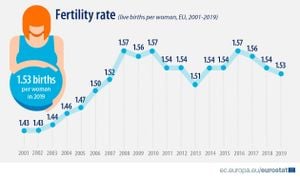Global health authorities, including the World Health Organization (WHO) and the U.S. Centers for Disease Control and Prevention (CDC), have issued alarming reports highlighting a significant rise in measles cases worldwide for 2023. With approximately 10.3 million reported cases, this marks a 20% increase from the previous year, underscoring the urgent need for vaccination.
The surge in measles cases is deeply concerning, particularly as it has been linked to inadequate immunization coverage. Data reveals more than 22 million children missed their first dose of the measles vaccine this year alone. While 83% of children globally received their first vaccine dose, only 74% completed the two-dose regimen needed to confer full immunity.
For effective prevention of measles outbreaks, health experts assert the necessity of achieving at least 95% vaccination coverage across both doses. Measles, known to be one of the most contagious diseases, poses considerable health risks, especially for young children.
Dr. Tedros Adhanom Ghebreyesus, WHO Director-General, emphasized the importance of the measles vaccine, stating, "Measles vaccine has saved more lives than any other vaccine over the past 50 years. To save even more lives and stop this deadly virus from harming the most vulnerable, we must invest in immunization for every person, no matter where they live." His sentiments reflect the urgent call for strengthening vaccination efforts including access to health services.
Countless children continue to bear the brunt of this preventable disease. The WHO and CDC report approximately 107,500 deaths attributed to measles in 2023, primarily affecting children under the age of five. Although this figure indicates an 8% decrease from the prior year, it remains alarmingly high. The reduction is largely credited to case clusters occurring where health and nutritional access are comparatively improved.
Measles is notorious not only for its infectiousness but also for the severe complications it can cause once contracted. Infants and young children are particularly vulnerable, facing potential long-term health consequences including blindness, pneumonia, and encephalitis, which can result in brain damage.
Measles outbreaks were documented across 57 countries, representing nearly a 60% increase from the 36 countries experiencing such outbreaks the previous year. The WHO regions affected included Africa, Europe, Eastern Mediterranean, and Southeast Asia, with Africa accounting for nearly half of the global outbreaks.
Though the Americas managed to stay free from endemic measles, the recent rise of cases poses questions about preventative measures taken, especially as 277 measles cases were reported across 32 jurisdictions within the United States up to November 2024. Most of these cases involved unvaccinated individuals, reiterative of the dangers posed by complacency surrounding childhood vaccinations.
Given this backdrop, immediate and targeted vaccination initiatives are required, especially within fragile and conflict-affected regions. Health officials stress the need for countries to bolster their public health immunization programs. Vaccination campaigns aimed at achieving high coverage are necessary to protect vulnerable populations where gaps exist.
Dr. Mandy Cohen, Director of the CDC, highlighted the rising risks associated with measles infections worldwide, stating, "The measles vaccine is our best protection against the virus, and we must continue to invest in efforts to increase access." The emphasis here is clear: increasing vaccination access is pivotal to combating this resurgence effectively.
Surveillance efforts must also be ramped up to monitor disease outbreaks and effectuate prompt responses. The Global Measles Rubella Laboratory Network has been identified as key to enhancing detection and responsiveness capabilities, ensuring health systems can act swiftly to mitigate outbreak impacts.
The barriers to vaccination are numerous and often deeply rooted, including issues of access, misinformation surrounding vaccines, and healthcare infrastructure inadequacies across various regions. These challenges underline the necessity for global cooperation and resource allocation to address health disparities and improve immunization rates.
Globally, the outlook for measles elimination faces formidable challenges, particularly against the backdrop of the global COVID-19 pandemic, which severely disrupted routine immunization programs. The 2023 data reflects not just local failures but signifies a broader, systemic problem affecting public health aims.
While strides are made—such as Brazil being reverified as having eliminated endemic measles—urgent actions remain required to safeguard global health. Maintaining momentum toward the goals established under the WHO's "Immunization Agenda 2030" is now more pressing than ever as both countries and organizations recalibrate their strategies to halt the alarming rise of measles.



